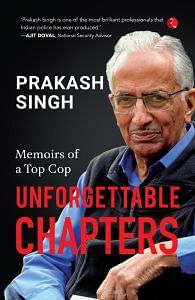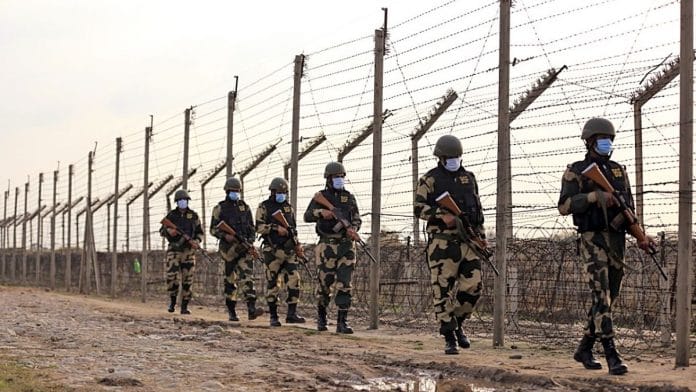As DG, BSF (1993–94), Jammu and Kashmir was my highest priority. We were directly responsible for internal security in the urban conglomerations. I made very frequent visits to that state. During my tours, I always made it a point to address the jawans. They may have been in large numbers (at the sector or battalion headquarters) or in small numbers (at forward locations), but I would always talk to the personnel, essentially to feel their pulse, know about their problems, motivate them and strike a rapport with them.
More than once, I remember having openly said that if war had to break out with Pakistan, I wish that happened during my tenure. My pep talk would charge the rank and file. I would invariably say that the Force must maintain an aggressive posture and assure the men that they would be protected by me if there were any bona fide mistakes. I am happy to record that the Force remembers me to this day for having shielded them in such situations at the highest level.
However, I would also make it clear in my address to the men that I would never forgive them for lapses on three counts. These were: misappropriation of cash or jewellery during cordon and search operations, misbehaviour with the womenfolk and any cold-blooded killings. I would emphasize that if such delinquency came to my notice, I would be the first person to punish them severely before the matter even reached the higher echelon. In retrospect, I think these were salutary instructions. These inspired the men, yet kept them on a tight leash.
Sopore
One incident is particularly worth mentioning. During one of my visits, when I had gone to Sopore, which was a hotbed of terrorist activity in those days, I was dismayed to see a Pakistani flag fluttering on one of the trees. I was quite agitated at the sight. As stated by an army officer, ‘What Jaffna is to the Liberation Tigers of Tamil Eelam [LTTE], Sopore is to Kashmiri militants’. On coming back to the battalion headquarters, I called two of my commandants (G.S. Bal and G.S. Virk) whose units were deployed in the area. I shared my anguish with them and said that a Pakistani flag on Indian soil was unacceptable to me and that it had to be removed.
The intelligence officer of the area told me that about 50–60 Afghan mujahideens were also camping in the village and therefore it was going to be a tough fight. That did not daunt me and I asked the commandants point-blank if they were prepared to undertake an operation to dislodge terrorists from Sopore. Both of them agreed. However, I felt that, as this was going to be a major operation in which there were bound to be casualties, I must take the home ministry into confidence.
I apprised N.N. Vohra, who was the home secretary at that time, about our plan. I took care to mention that, in the proposed operation, we would like at least one company of the Indian Army also. I made this suggestion so that in case there was a setback, we should be able to say that it was not an act of bravado on our part and that all possible measures were taken. Vohra said that he would have to bring this to the notice of the prime minister.
A meeting presided over by Prime Minister P.V. Narasimha Rao was subsequently held on 2 September 1993 in the South Block to discuss the Kashmir situation. It was attended, among others, by the home minister; minister of state or MOS (internal security); governor, J&K; principal secretary to the PM; cabinet secretary; home secretary; defence secretary; foreign secretary; chief of the army staff; director of the intelligence bureau (DIB); advisor, J&K; DG, BSF; and a few others.
The governor, J&K, gave a detailed appreciation of the Kashmir problem and lauded the role of the security forces. He emphasized that Sopore needed to be tackled and that their objective should be ‘to seek and destroy’ the militants. The DIB said that about 500–600 militants were waiting across the border to infiltrate and that the scenario was rather bleak. The MOS also drew attention to the concentration of militants at Sopore.
The BSF proposal to launch an attack on the militants and the foreign mercenaries at Sopore was brought to the notice of the Prime Minister. The implications of the operation were discussed threadbare. The army chief said that, according to the directorate of military intelligence, the operation would inevitably lead to casualties among the villagers and that this may become a major human rights issue. The government those days was very defensive on human rights matters. The Prime Minister, under the
circumstances, did not give us permission for the operation.
The Sopore operation could not be undertaken, but there was discussion that the DG, BSF, was prepared to undertake a hazardous operation about which others had reservations. The senior army officers developed a very healthy respect for me. A brigadier, while speaking to my principal staff officer, A.S. Mangat, said: ‘I wish we had a chief like yours’.
 This excerpt from Prakash Singh’s ‘Unforgettable Chapters: Memoirs of a Top Cop’, has been published with permission from Rupa Publications.
This excerpt from Prakash Singh’s ‘Unforgettable Chapters: Memoirs of a Top Cop’, has been published with permission from Rupa Publications.






